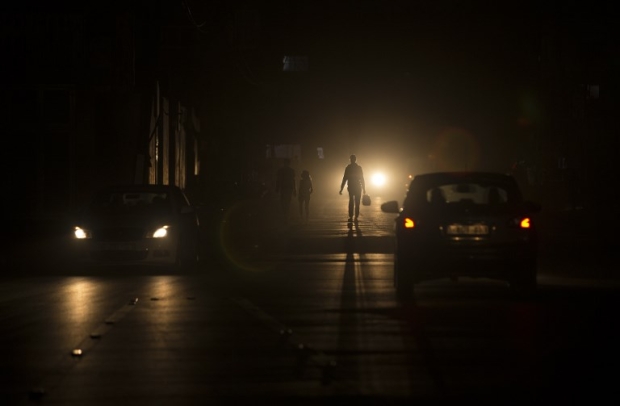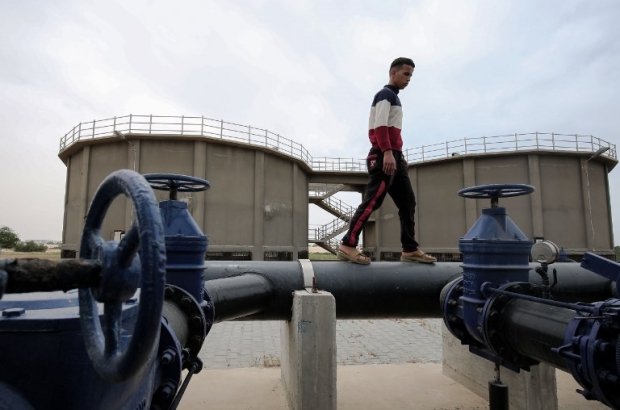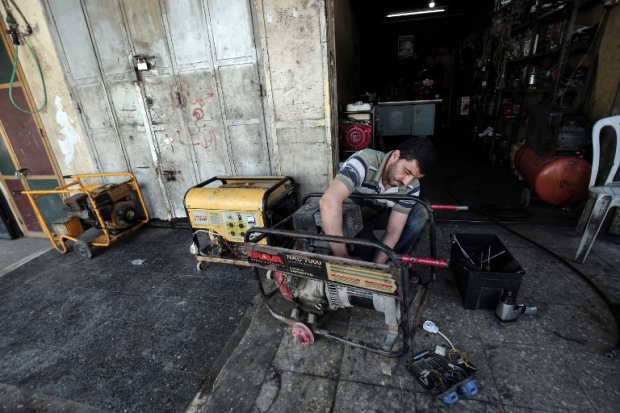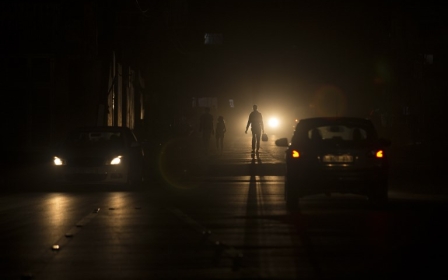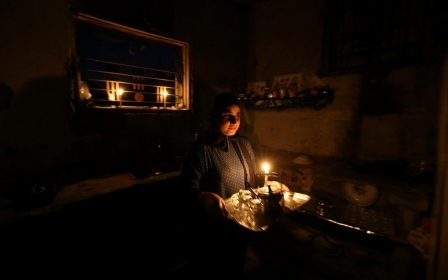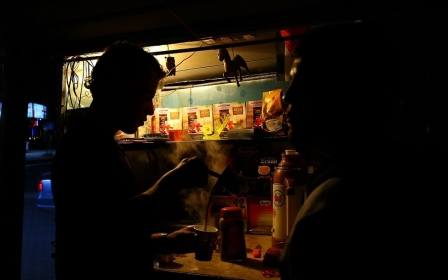A long hot summer: Amid Qatar crisis, Gaza hit by power cuts, feels shadow of war
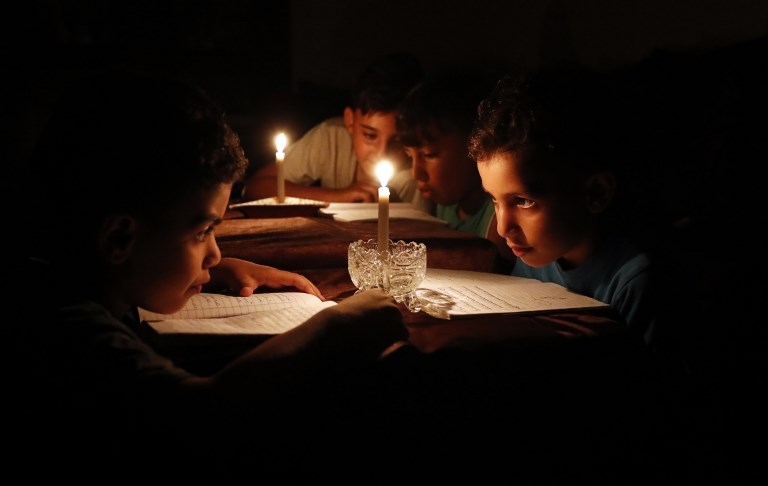
Mohammed Sallam is one of 700 patients in Gaza who suffers from renal failure. The 45-year-old has to go to the hospital three times a week to receive dialysis.
Last week, Sallam went to Al-Shifa hospital only for doctors to tell him that his treatment would be irregular due to more than 20 hours of power cuts every day.
"I don't know why all sides punish us this way," said Sallam, whose two children have cancer and are also affected by the current situation.
"More than two million citizens are political victims, and we have no vision for the future."
Impact on daily life
Gaza's electricity crisis began in 2006, when the sole power plant in Gaza was hit by an Israeli air strike.
The power plant was seriously damaged and began working with minimal capacity, forcing the Palestinian Authority (PA) to rely on electricity sent from Egypt and Israel.
Last May, the situation became further complicated and the power plant stopped functioning completely following a dispute between the PA, whose writ at present is effectively limited to the West Bank, and Hamas, which controls Gaza, about fuel tax. On 11 June, the Israeli government cut electricity supplies to Gaza following a request from the PA.
Due to this continuous shortage of electricity, Gaza's two million residents daily suffer more than 20 hours of power cuts. Now local authorities adopt a rotation system, cutting power from some areas to supply power to others.
Hospital generators cannot power every department and device. It puts pressure on staff and patients to use electricity efficiently when it is available.
According to Ashraf al-Qidra, the Gaza Ministry of Health spokesman, patients are direct victims of this "humanitarian crisis," as he described it.
Even without having to deal with power shortages, hospitals are already facing a crisis. Qidra said that "35 percent of basic and special medicines have run out from the ministry stores as a result of the ongoing siege [by Israel], in addition to 40 percent of important medical consumables".
The power cuts have the potential to hit, among others, 40 operating theatres, 11 cesarean sections units and 113 baby incubators – all reliant on electricity.
Then there are the drugs, laboratory materials and vaccinations stored in refrigerators.
Bayyan Alsakkah, an oncologist, said: "More than 15,000 cancer patients are in real danger, especially as 90 percent of cancer treatment is absent in Gaza.
"We are on our way to destruction if the current situation continues."
It is not only hospitals that are hurting.
Fathi Alshikh Khalil, deputy chief of Gaza's energy authority, told MEE that the crisis is also affecting schools, water supplies, and sewage pumps.
Khalil puts the blame on the Palestinian Authority and Israel, warning of the "grave consequences".
Doha to the rescue
Gaza has been here before. In January 2016, it underwent a similar power crisis, but Qatar stood by its side, by donating $12 million to buy fuel for Gaza's power plant.
But now Doha faces its own crisis – a deepening regional rift with Saudi, Egypt, Bahrain and the UAE, which have cut diplomatic and transportation ties with Qatar.
One of the reasons the coalition has given for cutting diplomatic ties is Qatar's support for Hamas.
During his visit in May to the region, US President Donald Trump accused Qatar of supporting terrorist movements, including Hamas.
Hamed Jad, a journalist specialising in economic affairs, told MEE: "Since 2013, Qatar has donated $407m to implement charity projects in Gaza, including building Hamad City, Al-Amal City, Hamad Hospital for Artificial Limbs, in addition to paving main streets."
Almost 80 percent of those projects have been completed. The others should be finished in the next few months.
Jad believes, however, that because Qatar has a sovereign wealth fund of around $400bn, Doha's foreign policy towards its allies will not be influenced by the current tension.
"Qatar's relation with Hamas and Gaza won't weaken," he said. "In fact, it will become stronger, to prove to the whole world its clear situation with Gaza.
"But in the current situation, Qatar won't directly intervene in Hamas's internal problems until solving the Qatari struggle."
Hamas caught out?
Following Israel's decision to cut electricity to Gaza, the strip is now down to about three hours of power each day.
Adnan Abu Amer, an Israeli affairs expert and head of the political science department at Al-Ummah University in Gaza, said that Hamas had been caught out by the Israeli move.
"Those steps were shocking to Hamas, starting with salary cuts [imposed on public employees by the PA in April], and moving to the electricity crisis," Abu Amer told MEE.
"I don't think that Hamas leaders thought that Israel would respond to the PA's request to reduce Gaza's electricity, especially after Hamas's continuous warnings of the possibility of a sudden mass explosion [of protests] as a result of the unlimited woes."
According to Ibrahim al-Madhoun, a Palestinian political analyst, Gaza's current crisis is a conspiracy against Hamas to isolate Gaza from the PA-controlled West Bank and the PA.
"It's an American and Israeli project. They want to accuse everyone who tries to help Gaza or Hamas, in order to make it easier for them to blackmail and control Hamas," Madhoun told MEE.
Madhoun said that even if Qatar wasn't facing its own crisis, it was unlikely that the Gulf state would be able to help Gaza this time.
"Even Turkey is not able to help Hamas in this situation. It's a strategic step to push Hamas towards the abyss."
"I think it's a coincidence to have all these conditions against Gaza and Hamas, but Israel is using those circumstances to its own advantage," he said.
"Israel will try to force Hamas to surrender without having to get into any direct confrontations with it."
Fear of another war?
That said, there is the shadow of possible conflict with Israel in the coming months.
According to Madhoun, war is possible at any moment, despite fears on the sides of both Hamas and Israel of such a consequence.
"Hamas is isolated from its regional allies, and a war at this time will cause a real massacre, as no one will intervene to put an end to Israeli crimes," Madhoun told MEE.
"Israeli forces will be free this time to commit their crimes against our people."
At the same time, however, Madhoun told MEE that Hamas is not weak, and Israeli leaders would likely fear facing losses should they choose to attack Gaza.
Moreover, a war on Gaza would put pressure on Israel.
"I don't think that Israel will attack Gaza, although it's a potential consequence," he said.
"A war on Gaza will make countries such as Saudi, Egypt, and the UAE feel very embarrassed. Those countries which accused Hamas of being a terrorist movement will have to change their stance immediately when the media is full of photos of slaughtered children in Gaza."
But for Sallam and two million other Gazan residents, a potential war with Israel isn't their worst fear for the time being.
And so Gazans keep posing the question: "Which is more pressing? A summer without electricity and water, or an Israeli war?"
This article is available in French on Middle East Eye French edition.
Middle East Eye delivers independent and unrivalled coverage and analysis of the Middle East, North Africa and beyond. To learn more about republishing this content and the associated fees, please fill out this form. More about MEE can be found here.


